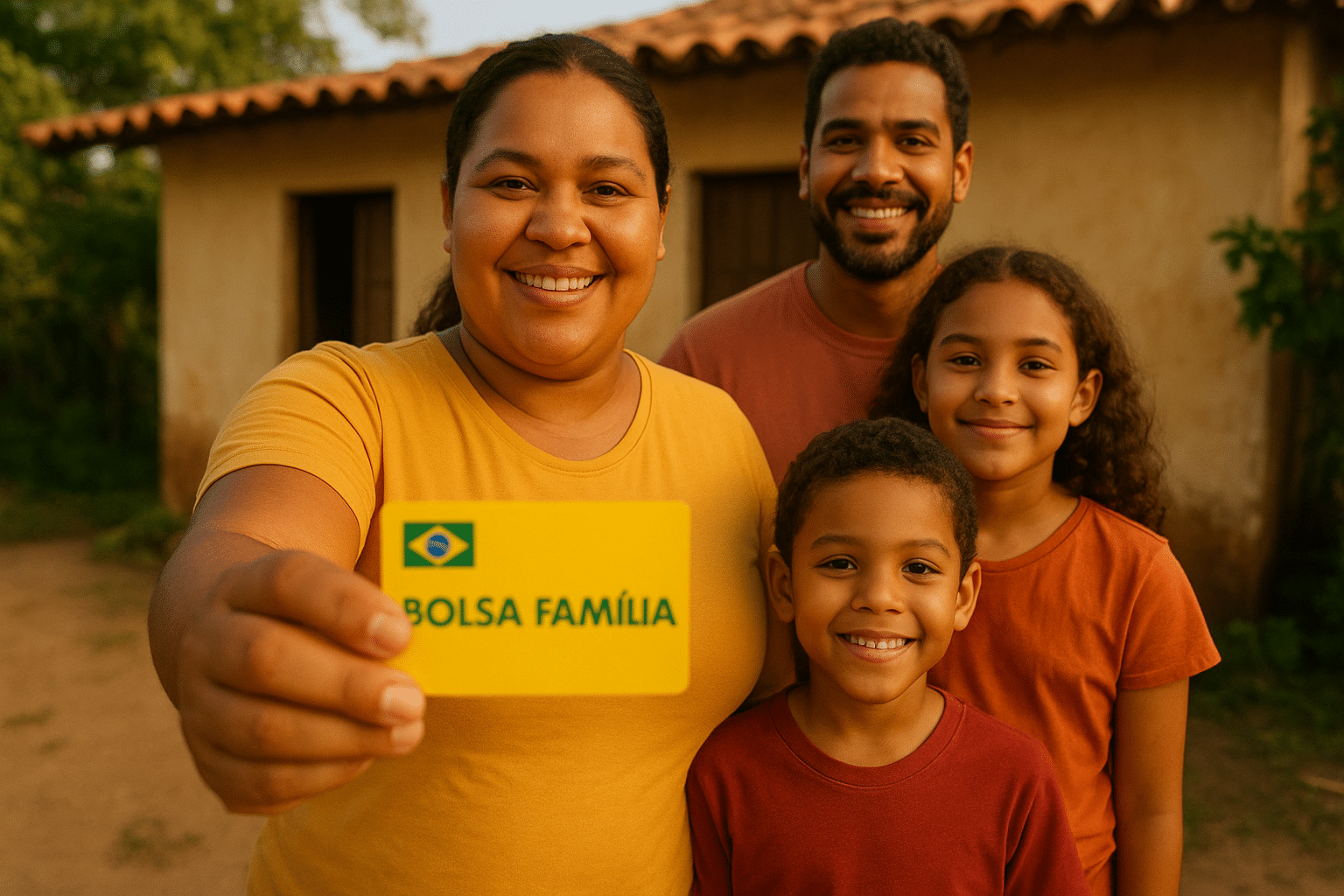Anúncios
In Brazil, financial inclusion is a key step towards empowering low-income families and fostering economic growth. One of the most talked-about opportunities in recent years is the possibility of accessing loans tailored specifically for Bolsa Família recipients. This transformative initiative has the potential to open doors for families looking to start small businesses, invest in education, or cover essential needs, offering a pathway out of poverty. 💡

But how exactly do these loan programs work? What are the requirements, benefits, and potential challenges for Bolsa Família beneficiaries? In this post, we’ll dive into all the crucial details, exploring how these financial tools can drive opportunities and help families achieve greater financial stability.
Anúncios
From understanding eligibility criteria to exploring how these loans differ from traditional credit options, we’ll provide clear, practical insights. Whether you’re looking to enhance your knowledge or seeking financial solutions, this comprehensive guide breaks down everything you need to know about loans for Bolsa Família recipients. 🚀
Expanding Access to Financial Resources for Vulnerable Families
In a groundbreaking move to foster economic inclusion, the Brazilian government has introduced new measures aimed at providing Bolsa Família recipients with improved access to credit. This initiative is designed to empower low-income families by offering them the tools to manage financial emergencies, invest in small businesses, and improve their overall quality of life.
Anúncios

Unlock Your Bolsa Família Benefits
How the Loan Program Works
The loans, tailored specifically for Bolsa Família beneficiaries, come with a low-interest rate structure, ensuring affordability for families already operating on tight budgets. The program establishes partnerships between public and private financial institutions to create accessible credit products that align with the unique needs of the low-income population.
- Eligibility Criteria: Applicants must be active Bolsa Família beneficiaries and meet basic financial assessment requirements.
- Loan Amounts: Loans range from R$500 to R$15,000, depending on the borrower’s repayment capacity.
- Interest Rates: Rates are set below market averages to prevent over-indebtedness.
Beyond financial assistance, the program also aims to integrate recipients into the formal banking system. This inclusion helps individuals build a credit history, which can lead to more financial opportunities in the future.
Partnerships and Oversight Mechanisms
To ensure the program’s success, a multi-stakeholder approach has been adopted. The government collaborates with private banks, microfinance institutions, and NGOs to manage and monitor the loan distribution process. Financial education programs are also being rolled out in parallel to help beneficiaries make informed decisions about borrowing and repayment.
Moreover, regulatory measures have been established to protect borrowers from predatory lending practices. The Central Bank of Brazil oversees compliance, ensuring transparency and fairness in loan agreements.
The Transformative Potential of Microcredit
Microcredit has long been recognized as a powerful tool for poverty alleviation. By extending loans to Bolsa Família recipients, the program aims to unlock a cycle of financial self-sufficiency. Borrowers can use the funds to:
- Start or expand small businesses.
- Invest in education or vocational training.
- Address urgent healthcare needs or housing repairs.
Studies conducted on similar programs in other countries have shown that access to microcredit can significantly improve household income levels, reducing dependency on government aid over time. In Brazil, this initiative has the potential to create a ripple effect, uplifting entire communities by fostering economic activity and job creation. 💼
Real-Life Success Stories
Stories from early participants of the program highlight its impact. For instance, Maria de Souza, a single mother from Bahia, used her loan to start a small food cart business. Within months, she not only paid off her loan but also doubled her household income. “This program gave me the chance to stand on my own two feet,” she said.
Such examples demonstrate how access to credit can transform lives, providing families with the tools to break the cycle of poverty.
Challenges and Criticism of the Initiative
Despite its promising potential, the loan program has faced some criticism. Critics argue that extending credit to financially vulnerable families may inadvertently lead to over-indebtedness if not managed carefully. To address this, the government has implemented stringent credit checks and repayment guidelines.
Another challenge lies in reaching remote and underserved areas where access to financial services remains limited. Partnerships with digital banking platforms are being explored to bridge this gap, but concerns about digital literacy persist, particularly among older populations.
Addressing Gender Disparities
An important aspect of the initiative is its focus on empowering women, who represent the majority of Bolsa Família recipients. Research indicates that women are more likely to use loans for productive purposes, such as starting businesses or investing in their children’s education.
To support female borrowers, the program offers specialized workshops on financial management and entrepreneurship. These efforts aim to equip women with the skills and confidence to take control of their financial futures. 👩💼
The Broader Economic Implications
On a macroeconomic level, the program could have far-reaching implications. By boosting the purchasing power of low-income families, the initiative is expected to stimulate local economies, particularly in underdeveloped regions. Increased consumer spending could, in turn, attract private investment and create jobs.
Impact on Income Inequality
Brazil has long struggled with income inequality, and programs like this one aim to level the playing field. By providing low-income families with access to credit, the government hopes to reduce wealth disparities and promote social mobility.
A recent study by the Institute of Applied Economic Research (IPEA) estimates that every R$1 invested in Bolsa Família generates R$1.78 in economic activity. If the loan program achieves similar results, it could mark a significant step forward in reducing inequality.
Looking Ahead: Building a Financially Inclusive Society
As the program gains traction, there is growing optimism about its potential to reshape Brazil’s financial landscape. By integrating Bolsa Família recipients into the formal economy, the initiative paves the way for a more inclusive and equitable society.
Future Plans and Innovations
The government has announced plans to expand the program, incorporating new technologies such as blockchain to ensure transparency in loan distribution. Discussions are also underway to introduce insurance products tailored to low-income families, providing additional financial security.
These developments signal a commitment to creating long-term solutions that address the root causes of poverty, moving beyond temporary relief to foster sustainable development. 🌱
Conclusion: Empowering Bolsa Família Recipients Through Financial Inclusion
The introduction of loan opportunities for Bolsa Família recipients marks a transformative step in Brazil’s journey toward economic inclusivity. By combining low-interest microcredit with financial education and robust oversight mechanisms, this program provides a lifeline for vulnerable families striving for stability and self-sufficiency.
The initiative not only addresses immediate financial needs but also empowers recipients to invest in long-term solutions such as entrepreneurship, education, and housing improvements. 🌟
While challenges like over-indebtedness and digital accessibility remain, the government’s proactive measures—such as stringent credit checks, financial literacy programs, and partnerships with digital banking platforms—demonstrate a clear commitment to mitigating risks.
Moreover, the program’s emphasis on empowering women underscores its potential to drive gender equity, as women often channel financial resources into initiatives that benefit their families and communities. 👩👧👦
On a macroeconomic level, the ripple effects of increased purchasing power and local economic activity cannot be understated. By integrating underserved populations into the formal financial system, the program fosters a more inclusive economy while contributing to reduced income inequality.
As future innovations, including blockchain technology and tailored insurance products, are explored, the program holds the promise of creating a financially inclusive society. 🚀
In conclusion, the Bolsa Família loan initiative exemplifies how targeted financial programs can unlock opportunities, break cycles of poverty, and pave the way for sustainable economic development. With its transformative potential, it serves as a blueprint for fostering resilience and empowerment in vulnerable communities.

